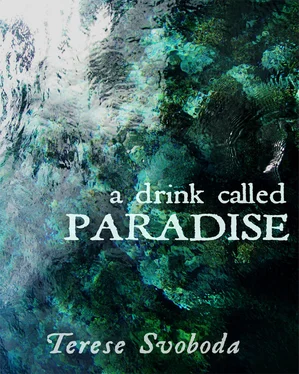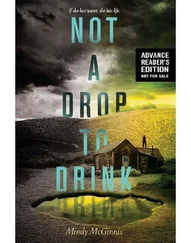My never doesn’t even figure, I can’t even hold it in my mouth. As if I am always thinking of dancing, I take his arms, I grab hold of the ones that held the stick, the ones that beat on the last crab and then lifted the juice of its last self up to his lips in a cup, and I dance in those arms in the moonlight over the stink of the shells and the old fire.
It’s a slow, slow dance, the kind sometimes you don’t even lift your legs for, or turn, and sometimes you nearly fall over it’s so slow. Of course I hum while he says he’s not leaving here, he’s never leaving here, it’s his place forever.
Beseech thee, I am not lost.
Ngarima lies face down on the sand, coughing and moaning.
I beseech thee, she moans.
I sink my feet deep in the sand and study my way. And study Ngarima, yes, I must study her. It is only a little time since her son sailed off — I think. I am not sure anymore. So many nights, and if you sleep in the day covered by leaves, the days are nights too. It all gets to be night.
I am not walking anywhere when I walk here in the dark, so I walk closer, but not too close. Her grand bulk is so prostrate, her coughing so loud, those moans so hollow, like an echo off the moon. In the glow of that moon, what glows green in her hand? What hot piece of what?
Ngarima kisses that ghostly glow, then she plants it in the sand inches from her fingers, upright so it looks like it’s standing.
It’s a plastic Jesus. A car Jesus that glows.
Light is power, she says. She knows I’m here, I think. She coughs.
Are you all right? I ask because that’s what everyone asks me.
I am fine, she coughs. Nothing is wrong. Nothing. She says nothing the way Barclay says yes , the way I say nothing . And you are walking? She sits up. If you walk alone in the bush, you know, a man is always walking too.
I like the moon.
She looks at its shine on her hands.
The moon is the whole island at night, she says. At night the island lives and we are ghost people. Whose eyes can see in the midday light? Then there’s too much light. Light is power, isn’t that what you call it? She coughs. Light is the sex of life, it is what keeps us going, light is what happens in the night to get the day to rise.
The Jesus falls over in the sand in front of her. She picks it up like it’s a shell she’s found, turns it over, and pockets it very fast as if I don’t see. She looks up from her pocket. She says, The light that came over the island was in the day, that light, you never think again without thinking of that light, that second sun.
The palms cut the moonlight into jagged beams that sway.
She begins to sing “O Little Star of Bethlehem.” Some of the words are hers, high and cracked and coughed. When she stops, she says, That was just the first star. I learned that when the army came and taught us songs.
She begins to swing her hips in dance. We take what we want of them. You see, she says, flaring her fingers, this is the star. We change the song to include that other light. This is how we do that. She covers her face. You see, we did see. That is what we did do. Light is power, she says. She rises and stumbles forward onto the hem of her vast dress.
I move to steady her, but she backs away.
You’re lost? she asks. Not to be here is lost, she says. She says, No one is lost here.
But she takes the Jesus back out of her pocket and pounds her chest with it.
I look out to sea the way an old man might, the way a Crusoe might who has not yet eaten his friend or, anyway, has not yet come to that moment of to eat or not to eat that all castaways must either physically or mentally come to, and I ask, Where is a friend?
This is a Sunday, and everyone is nowhere, they’re all decked out and gone, matching flowers, bolt after bolt, all the women wrapped neck to ankle, all the men in shirts white as seacrest, gone off to that Latter Day preacher’s, to his mission, the cement hut behind the flagpole that says what it says about love.
I know because I went once, in the pitch of my tourist fever when I had to divine all things island in my few days, the soul and the soup, the mean and the aberrant. I am not an every-week or even every-year churchgoer. I said to Ngarima long ago, The sea is what I worship, but now what is worship when there is no boat? No vessel, such as the son, to float out past the brimstone, to seek rest.
I’m restless.
I scratch my bites bloody, the ones that I get in the pit where the wind doesn’t blow, where it’s warm all night and bugs feast. I forget the bad parts while I scratch, I forget what I do every day, whether it’s Sunday or not, I forget and I scratch because that’s the best I can do. I scratch at my scalp, where I haven’t had soap for how long? My scalp itches. I dig into the hot sand with the top of my head where it itches, I stay upside down until the itching is over, and who notices?
I let my son drain out.
The singing today is sirenlike, and the wind doesn’t oppose it. I don’t either, I carry it along with me, I dart from tree to tree down the beach as if they are a clef and me the music, I stand Fridayless, on a Sunday, in the lee of the song and look in.
Three rows of flowered chests swell chastely across from a row of white-dress-shirt-chested men. The missionary — I hardly know him without his helmet — climbs into the pulpit and blesses everyone, and me too, since my standing outside is not blocked by a window or screen but just waist-high pressboard over a row of cinder blocks.
I am the usual statue the congregation turns to look at when he blesses me.
I smile my smile that says, Go on.
The missionary clears his throat, he talks a long time about what the world will be like after it ends, but he mixes all of that with now. In my current state, I can’t sort it out, Who are the angels after? What’s the difference between this ending and the other?
Mr. Harry, is what he stops with, will you please advance?
Harry’s three men in, and the others have to turn their knees to the side after he says, Oh, yes in puzzlement. He walks to the church front where the missionary’s moving his big book around on his pulpit and resettling it.
The sight of Harry facing me, facing all of us, stops my scratching. I lean into the window, my jagged nails pressing into the pressboard. Other women lean into their pews, a woman waves from the back as if it is All right or as if it is Honey , and Harry is up to it: the castaway’s castaway, wearing the island’s starched shirt and dark pants, with a beard covering his most white features, with the rest of his skin dark and darker, but puzzled in the angle of his head, his body shifting.
You have heard the story of the apocalypse, Mr. Harry? Our text for today?
Your reverence, he says and bows his head.
The missionary sighs with satisfaction. In the apocalypse there is a reckoning, he says. More than one. And here, when some time passes, we too reckon.
Yes? says Harry.
You have come to stay with us. We are grateful for that, he says. You have come to stir the soil for us. But, he says before Harry can nod again, you must follow the Lord’s laws, even the one that says a man must not know a woman other than his wife.
Harry can’t find his face — the one he has is laughing, is incredulous, dismayed. I see, he says.
I am sorry, says the missionary. There is a fine.
Fine, Harry says after him. Fine?
Do you need someone to testify the truth? Do you need a witness? asks the missionary.
The congregation has some ideas about that, they murmur.
The missionary turns to Barclay before Harry can answer. Can’t you hush them?
Читать дальше












